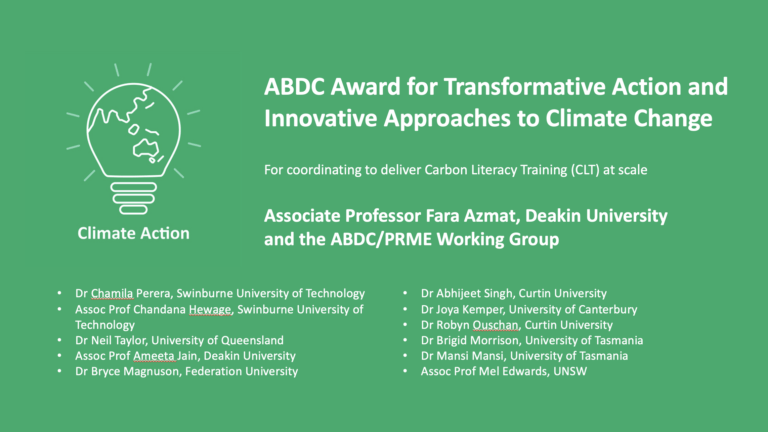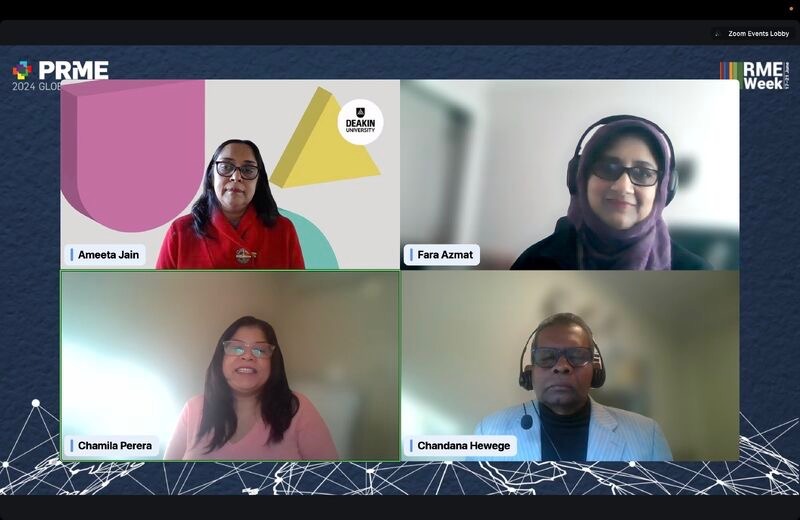2024 Network Awards – Transformative Action and Innovative Approaches to Climate Change

Winner:
Associate Professor Fara Azmat, Deakin University, and the ABDC/PRME Working Group
Judges’ comments
The panel recognises this initiative as an excellent example of promoting carbon literacy in a university setting. This initiative is collaborative and includes all business disciplines. The team presented compelling evidence of its potential impact and scalability at the UN PRME Forum 2024, as well as the delivery of carbon literacy training to UN PRME Asia-Pacific. The increase in participation in the program during 2023 and 2024 strongly indicates the initiative’s success, which is measured by CO2 reduction pledges, improved literacy, and multiplier effects within business schools to drive systemic change.
The initiative
The ABDC/PRME (ANZ) working group (WG) on climate action conducts Carbon Literacy Training (CLT) to enhance the efforts of Australian Business Schools (BS) in addressing climate action. The CLT rollouts bring together members from diverse disciplinary backgrounds (e.g., Management, Marketing, Finance, Accounting and International Business) and professional staff from eight BS across Australia and NZ to create transformative change in the community. Adopting an innovative approach, the CLT initiative goes beyond raising awareness to take transformative climate action. It fosters BS collaborations in business curriculum development involving climate awareness and action, advancing climate change research, and climate-friendly operational practices. It encourages participants to pledge to make low to high-impact climate action through individual and collective actions within their sphere of influence in BS that spills over to the broader community with a multiplier effect.
Since 2023, the team has rolled out two CLT events attended by 116 academics, professional staff, and student leaders in the ANZ region, resulting in a substantial amount of carbon saving pledged. The team has also organized three Community of Practice (CoP) events, focusing on meaningful business school practices and pedagogies on climate, the impact of new legislation on responsible education, and interdisciplinary collaboration under emerging climate disclosure standards. These events attracted over 80 academic and professional staff nationwide.
The WG’s success highlights its scalability potential offering a model that empowers BS educators to replicate it across other institutions and advocate for industry-wide change. Strong engagement and collaboration across multiple BS amplify the initiative’s reach and transformative impact on education and society.
How it was implemented
The WG engaged in several brainstorming sessions, encouraging critical inquiry and collaborative discussions where the members shared climate action experiences, fostering mutual learning. Experts in carbon literacy provided insights on integrating climate action into teaching and research, leading to outcomes such as curriculum designs, research projects, and transformative climate initiatives.
One of the WG’s most transformative achievements is the transition from a four-day delivery to a comprehensive day-long accelerated version of CLT tailored and updated for BS professionals and educators in the context of Australia. Based on the original CLT course developed by the University of Queensland (UQ) and rolled out in partnership with Swinburne, Deakin, Fed Uni, UQ BS, and the Carbon Literacy Project UK, this unique training focuses on fundamentals of climate change and the solutions that people can take individually and collectively through professional practices in BS in the areas of education, research, leadership, governance, and engagement.
Typically delivered over two weeks, this accelerated version of the CLT is condensed into a day-long training, including five self-study modules and 6 hr live online sessions, run by WG who are accredited as carbon literacy facilitators and trainers.
This innovative approach received international recognition at the 2024 UN PRME forum, where WG members showcased CLT as a scalable, replicable model for integrating climate action into business education globally, highlighting its potential for widespread impact and transformation.
The CoP events organised by the WG have also served as a critical platform for fostering dialogue and innovation, encouraging cross-disciplinary collaboration in fostering climate literacy and integrating sustainability and climate-related risks into teaching and research and the impact of emerging climate disclosure standards on business education.
Measurable outcomes
In 2023-24, the WG conducted two nationwide CLT rollouts and presented at global forums, including the UN PRME Forum 2024 and the UN PRME Asia Pacific CLT delivery. This global reach, driven by the multiplier effect of CLT, highlights the WG’s impact in advancing meaningful change in business education and beyond as outlined below.
Sphere of Influence: The WG
enhanced its influence by certifying 32 Carbon Literate (CL) individuals in 2023 who are creating multiplier effects in their roles within BS, inspiring climate action and shaping future business leaders. These CL advocates contribute to climate-focused education, drive research, and promote practical business solutions, while encouraging universities to adopt sustainable policies and strategies.
Carbon Savings: In 2023, the CLT participants pledged a CO2 reduction of 4,085 tonnes through individual and collective actions. The pledges focus on several areas of impact, including pedagogical approaches to embed climate awareness in business curricula, BS’ operations-related climate actions, on-campus behaviour, climate-friendly transportation, energy efficiency, dietary changes, and waste reduction.
Participant Engagement: Interest in the initiative has grown steadily, with over 100 initial EOIs received in each CLT call. In 2023, representatives of 51 BS academics, professional staff, and HDR students actively took part. In 2024, participation rose to 65 (14% increase) (certification pending), indicating a broader recognition of the WG’s vital role in addressing climate change.
Outcomes: In addition to its multiplier effects, CLT has helped BS meet net-zero targets, influencing national climate policies, and advancing UN SDG 13. The WG successfully transformed climate education into action, driving sustainability and systemic change within the business-education sector.



